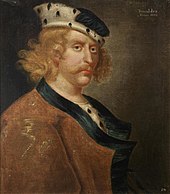Edmund was the son of Malcolm III, but when Malcolm and the eldest brother Edward died, Edmund chose to side with his uncle Donald instead of having the throne go to one of Malcolm's other sons, such as himself or Edgar or Ethelred. William of Malmesbury said Edmund bargained "for half the kingdom" from Donald; if true, it suggests that Edmund would inherit the kingdom after Donald.
Malcolm and Margaret's next surviving son, Edgar, gained the support of English King William Rufus. According to Malmesbury, Edgar and his uncle, Edgar Ætheling, invaded Scotland with the military support of the Anglo-Normans and that Donald was "slain by the craftiness of David [Malcolm and Margaret's youngest]... and by the strength of William [Rufus]." Historian John of Fordun, writing years later, says Donald was blinded and imprisoned. He supposedly died in 1099 at the age of 67, having spent his last years in captivity.
Malcolm's son Edgar then became Edgar I of Scotland (his seal is shown above). Although he reigned for a decade (1097 - 1107), he never gained complete control of all parts of Scotland. Military support from William II "Rufus" of England would have helped, but William had his own issues like a revolt in Northumbria and spending time in Normandy, which he purchased from his brother Robert Curthose.
Still, Edgar maintained a relationship with the English court, and not as a vassal to the English king. Records show the king paying for Edgar's expenses at court, which would not be necessary if William were Edgar's feudal lord. He seems to have been an honored guest. Edgar was sword-bearer for the king in the inauguration of the new Westminster Hall. After William's death, however, this closeness ended: he was not present at Henry I's coronation.
A few notable events appear in the sparse records of his reign. He signed a treaty with Magnus Barefoot of Norway, creating a firm border with Norwegian claims in the western part of the north. He also gave a unique gift to the High King of Ireland, Gael Muirchertach Ua Briain. It was a camel (but might have been an elephant) brought back from the First Crusade. He also connected with Anselm of Canterbury to bring back the monks of Canterbury that Donald had expelled from his mother's favorite Dunfermline Abbey.
Edgar never married. He died on 8 January 1107, leaving his brother Alexander as his successor—but not for the whole country. His will also granted their younger brother David the former kingdom of Strathclyde. This did not make David a king: he was still a prince and his older brother's subject. As for Alexander himself, he did not gain a reputation as a nice king, but that's a story for tomorrow.



